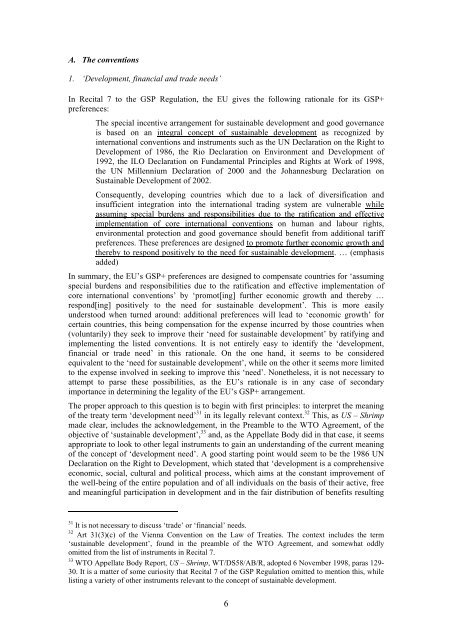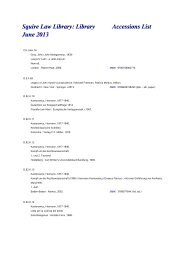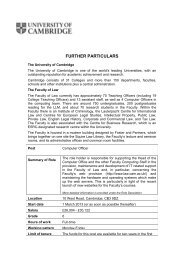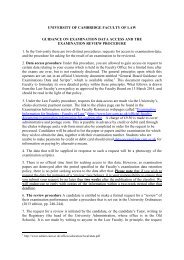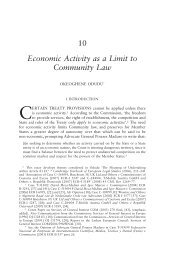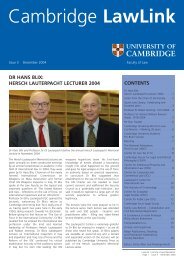The WTO legality of the EU's GSP+ arrangement Dr Lorand Bartels ...
The WTO legality of the EU's GSP+ arrangement Dr Lorand Bartels ...
The WTO legality of the EU's GSP+ arrangement Dr Lorand Bartels ...
You also want an ePaper? Increase the reach of your titles
YUMPU automatically turns print PDFs into web optimized ePapers that Google loves.
A. <strong>The</strong> conventions1. ‘Development, financial and trade needs’In Recital 7 to <strong>the</strong> GSP Regulation, <strong>the</strong> EU gives <strong>the</strong> following rationale for its <strong>GSP+</strong>preferences:<strong>The</strong> special incentive <strong>arrangement</strong> for sustainable development and good governanceis based on an integral concept <strong>of</strong> sustainable development as recognized byinternational conventions and instruments such as <strong>the</strong> UN Declaration on <strong>the</strong> Right toDevelopment <strong>of</strong> 1986, <strong>the</strong> Rio Declaration on Environment and Development <strong>of</strong>1992, <strong>the</strong> ILO Declaration on Fundamental Principles and Rights at Work <strong>of</strong> 1998,<strong>the</strong> UN Millennium Declaration <strong>of</strong> 2000 and <strong>the</strong> Johannesburg Declaration onSustainable Development <strong>of</strong> 2002.Consequently, developing countries which due to a lack <strong>of</strong> diversification andinsufficient integration into <strong>the</strong> international trading system are vulnerable whileassuming special burdens and responsibilities due to <strong>the</strong> ratification and effectiveimplementation <strong>of</strong> core international conventions on human and labour rights,environmental protection and good governance should benefit from additional tariffpreferences. <strong>The</strong>se preferences are designed to promote fur<strong>the</strong>r economic growth and<strong>the</strong>reby to respond positively to <strong>the</strong> need for sustainable development. … (emphasisadded)In summary, <strong>the</strong> EU’s <strong>GSP+</strong> preferences are designed to compensate countries for ‘assumingspecial burdens and responsibilities due to <strong>the</strong> ratification and effective implementation <strong>of</strong>core international conventions’ by ‘promot[ing] fur<strong>the</strong>r economic growth and <strong>the</strong>reby …respond[ing] positively to <strong>the</strong> need for sustainable development’. This is more easilyunderstood when turned around: additional preferences will lead to ‘economic growth’ forcertain countries, this being compensation for <strong>the</strong> expense incurred by those countries when(voluntarily) <strong>the</strong>y seek to improve <strong>the</strong>ir ‘need for sustainable development’ by ratifying andimplementing <strong>the</strong> listed conventions. It is not entirely easy to identify <strong>the</strong> ‘development,financial or trade need’ in this rationale. On <strong>the</strong> one hand, it seems to be consideredequivalent to <strong>the</strong> ‘need for sustainable development’, while on <strong>the</strong> o<strong>the</strong>r it seems more limitedto <strong>the</strong> expense involved in seeking to improve this ‘need’. None<strong>the</strong>less, it is not necessary toattempt to parse <strong>the</strong>se possibilities, as <strong>the</strong> EU’s rationale is in any case <strong>of</strong> secondaryimportance in determining <strong>the</strong> <strong>legality</strong> <strong>of</strong> <strong>the</strong> EU’s <strong>GSP+</strong> <strong>arrangement</strong>.<strong>The</strong> proper approach to this question is to begin with first principles: to interpret <strong>the</strong> meaning<strong>of</strong> <strong>the</strong> treaty term ‘development need’ 31 in its legally relevant context. 32 This, as US – Shrimpmade clear, includes <strong>the</strong> acknowledgement, in <strong>the</strong> Preamble to <strong>the</strong> <strong>WTO</strong> Agreement, <strong>of</strong> <strong>the</strong>objective <strong>of</strong> ‘sustainable development’, 33 and, as <strong>the</strong> Appellate Body did in that case, it seemsappropriate to look to o<strong>the</strong>r legal instruments to gain an understanding <strong>of</strong> <strong>the</strong> current meaning<strong>of</strong> <strong>the</strong> concept <strong>of</strong> ‘development need’. A good starting point would seem to be <strong>the</strong> 1986 UNDeclaration on <strong>the</strong> Right to Development, which stated that ‘development is a comprehensiveeconomic, social, cultural and political process, which aims at <strong>the</strong> constant improvement <strong>of</strong><strong>the</strong> well-being <strong>of</strong> <strong>the</strong> entire population and <strong>of</strong> all individuals on <strong>the</strong> basis <strong>of</strong> <strong>the</strong>ir active, freeand meaningful participation in development and in <strong>the</strong> fair distribution <strong>of</strong> benefits resulting31 It is not necessary to discuss ‘trade’ or ‘financial’ needs.32 Art 31(3)(c) <strong>of</strong> <strong>the</strong> Vienna Convention on <strong>the</strong> Law <strong>of</strong> Treaties. <strong>The</strong> context includes <strong>the</strong> term‘sustainable development’, found in <strong>the</strong> preamble <strong>of</strong> <strong>the</strong> <strong>WTO</strong> Agreement, and somewhat oddlyomitted from <strong>the</strong> list <strong>of</strong> instruments in Recital 7.33 <strong>WTO</strong> Appellate Body Report, US – Shrimp, WT/DS58/AB/R, adopted 6 November 1998, paras 129-30. It is a matter <strong>of</strong> some curiosity that Recital 7 <strong>of</strong> <strong>the</strong> GSP Regulation omitted to mention this, whilelisting a variety <strong>of</strong> o<strong>the</strong>r instruments relevant to <strong>the</strong> concept <strong>of</strong> sustainable development.6


